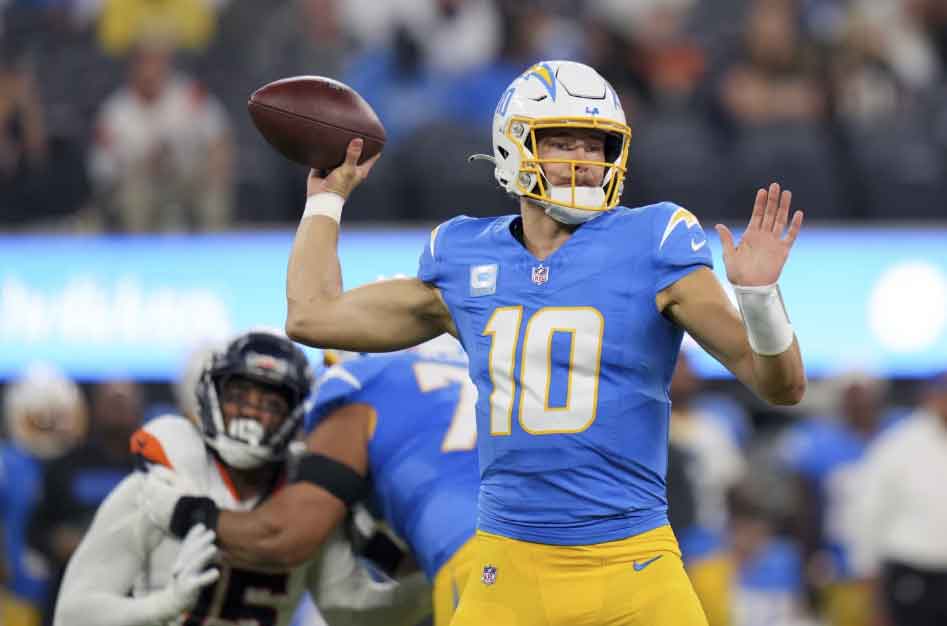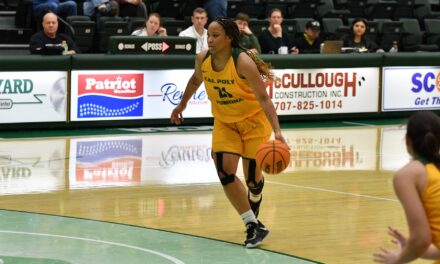Chargers Best Broncos in Thursday Night Shootout
In a battle between two former University of Oregon quarterbacks, the Chargers prevail over the Denver Broncos behind a healthy offensive production through the air and on the ground.

Austin Gage
Shaking off any offensive dysfunction that may have developed in the second half of the previous week’s matchup against the Tampa Bay Buccaneers, the Los Angeles Chargers showcased their ability to put up big numbers in a 34-27 victory over the Denver Broncos on Thursday night.
Entering the Week 16 divisional showdown one game behind the Broncos in the AFC West standings and the overall AFC playoff picture, the Chargers desperately needed a win to ensure that their playoff chances would remain attainable and realistic. Having lost three out of their last four, Los Angeles’ once secure playoff spot was now one that was a bit more under question.
These two teams met earlier in the season as the Bolts defeated their rivals 23-16 on the road. However, this was not the same team they had faced earlier, as the Broncos came into the midweek clash on a four-game winning streak and as one of the hottest teams in the entire league.
Heralded as boasting two of the top defensive units, Los Angeles and Denver had been accustomed to winning games with lower-scoring outputs thanks to those efforts on that side of the ball. With that said, Thursday’s game threw any plans of that continuing out the window. After an early Chargers’ punt on the first drive of the game, the teams traded points throughout the remainder of the game.
Broncos rookie quarterback Bo Nix, the 12th overall pick in April’s draft, maintained his play as a standout first-year player. Leading a ten-play, 72-yard drive, Nix and Denver scored the first points of the night thanks to a three-yard rushing score by fellow rookie running back Audric Estime.
Not to be outdone, star quarterback Justin Herbert responded immediately. A healthy split between passing and running play calls allowed the Chargers to march down the field with the same ease as their opponents did on the previous drive. Punched in via a one-yard rushing touchdown by Gus Edwards, Los Angeles knotted it back up at 7 late in the first quarter. Edwards, who has seen a great uptick in workload in the aftermath of starting running back J.K. Dobbins’ IR stint, carried the football 14 times for 68 yards and added two touchdowns.
The Chargers could not afford to take their foot off the break, at least in the first half. Back-to-back drives for the Broncos resulted in a Nix passing touchdown, and due to a Cameron Dicker successful field goal sandwiched between those drives, Los Angeles found themselves in a quick 21-10 hole midway through the second quarter. Nix, who played his college ball at Auburn University and the University of Oregon, as did Hebert for the latter, completed 29 of 40 passes for 263 yards through the air with two passing touchdowns and three carries for 25 yards on the ground. Both passing touchdowns saw the 24-year-old use his feet to set up a throw on the run for six.
A punt for each team followed on the next two drives of the game and the Chargers started another drive late in the second quarter with just over two minutes left. Connecting with a wide-open Ladd McConkey for 21 yards over the middle, Herbert brought the Los Angeles offense up to the Denver 26-yard line with 50 seconds remaining. The rookie wide receiver McConkey would go on to catch six balls for 87 receiving yards and remain a staple of consistency for a Charger offense that has been anything but consistent.
Unfortunately, Herbert would throw the drive away on a pass targeting wide receiver Joshua Palmer over the middle of the field just around the endzone and it looked like the Bolts would go into the half with the same 21-10 deficit.
Then, in a bizarre sequence of events after a good stand by the Chargers’ defense to force a punt of the Broncos’ offense, a Denver defender ran into Los Angeles punt returner Derius Davis on the punt with zero seconds remaining. Because of a penalty called for fair catch interference on Davis, Dicker was allowed to come on to attempt an extremely rare “fair catch kick” that saw a free holder and no field goal defense in a play that almost resembled a kickoff. Dicker converted the 57-yard free fair kick attempt, which was the first made of this specific sort since 1976, and cut the Broncos’ lead to 21-13.
“It’s my favorite rule in football,” joked head coach Jim Harbaugh after the game. “[Cameron] Dicker stepped up and nailed it and I thought that was huge. It got the momentum back going into halftime.”
Playing off that newfound momentum after the strange kick before the half, Los Angeles locked in for the final two quarters. After allowing a field goal to Denver on the first drive of the second half, the Chargers defense burnt out the flames of a red-hot offensive unit. Three straight punts and a late field goal forced by the group allowed enough space for the offensive side of the ball to take control and eventually win the game.
“Our guys really just stayed the course coming out of halftime. We just wanted to tighten some things up and tackle better, which our guys did,” Harbaugh said regarding his defense.
On that offensive side of the ball, it was almost flawless. Taking away one possession late midway through the fourth quarter, Los Angeles scored a touchdown on every drive they needed to in the second half.
First, it was a ten-play, 70-yard march down the field to cut the Bronco lead down to 24-19. Herbert showcased his ability to move on his feet on the drive as he broke two tackles on a stellar 18-yard rush up the middle to bring the drive into Denver territory. A handful of plays and an unnecessary roughness penalty later, Edwards found the endzone from five yards out.
Second, it was an air-dominated drive to take the lead on a drive that started at the end of the third quarter and culminated early in the fourth. With completions of 12, 6, 6, 17 and 19 yards, Herbert displayed impressive arm talent en route to a go-ahead touchdown. On the 19-yard completion, the former escaped the pocket to the left, fired a ball cross body and found a covered Davis along the left sideline in the endzone for a highlight-worthy score.
“It was just an awesome experience to go out there and make a big play like that, that’s what we dream of, especially in that time too,” said Herbert.
If that wasn’t enough, Herbert was able to find Palmer at the very back of the endzone for a bobbling catch after a tip on the two-point conversion to give the Chargers the lead, 27-24.
And third, after another great stop by the defense to force a punt as mentioned above, the Chargers mixed in a drive with massive gains through the air and on the ground to put the final touches on their impressive second-half rally. Herbert rattled off a 16-yard gain on a crucial third down and saw his running back explode for 43 yards on the very next play. Finishing it off, Herbert shoveled a pass to running back Hassan Haskins short and the latter raced to the endzone thanks to a nifty juke move. Los Angeles took a 34-24 lead with just over two minutes left in the game that they would not look back from.
A field goal and onside kick attempt made things nervous for Chargers fans, but the onside attempt failed and Los Angeles escaped with a thrilling win. In the end, it was a Justin Herbert performance that reminded many that he was still one of the league’s best. He threw for 284 yards on 23 for 31 passing to pair with two touchdowns and eight carries for 28 yards rushing.
The Chargers, who jumped the Broncos in the playoff standings, are now in the six seed position. Next week, they will travel to Foxborough to face the New England Patriots in a Week 17 matchup to secure their playoff spot even better.









